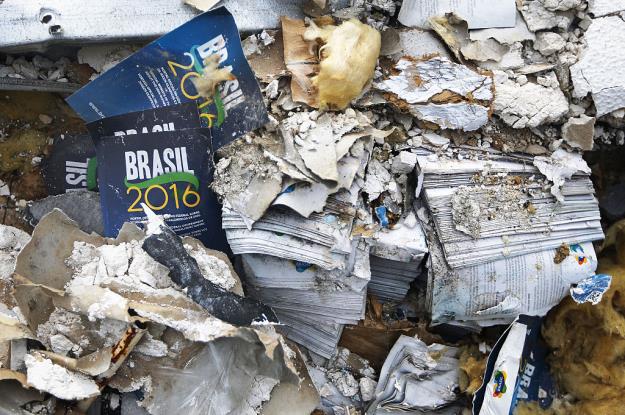I teach at the State University of Rio de Janeiro, one of the most important educational institutions in Brazil, with more than 30,000 students. Broad programs of affirmative action have ensured that many of those students are from poor backgrounds, often the first members of their families to go to college. They are part of the new middle class of 40 million Brazilians who left poverty in the last decade. One year ago, when Rio prepared for the global party that was the Olympics, many felt as though it was their celebration too – the future seemed brighter for them, for their families, for Rio.
Now, graduation, with its financial and social rewards, is a dream under threat. Even making ends meet has become a daily challenge. The state government has a deficit of R$20 billion ($6.29 billion) in 2017. It is so broke it is unable to meet its most basic financial obligations: Academic salaries and student scholarships are months late; the April installments were paid only in July. Administrative employees have been on strike since January. The libraries are closed. Morale is so low that I frequently see students and even professors weeping on campus.
As a professor, I suffer the consequences along with them. As a political scientist, I think back to how we got to this point. How did things go so wrong, so fast, for Rio?
A perfect storm
First off – Rio de Janeiro’s crisis is clearly linked to Brazil’s recession, which is its longest and deepest in 100 years. After two consecutive years of GDP contractions of over 3 percent, the Brazilian economy is smaller today than in 2010. Rio has suffered disproportionately: Unemployment in the state is now 14.5 percent, higher than the national average of 13.3 percent. And it has ramped up fast: Eight of 10 Brazilians who lost their jobs in 2017 lived in Rio.
This is due in part to the unique way the state combined oil exploration and mega-sporting events – two major sources of revenue and international investment and attention during the past decade – with an old staple, corruption. The mixture was explosive, and now that the party’s over, we are left in tatters, picking up the pieces.
The crisis in Rio offers a stark contrast with the high expectations of the years when the city was chosen to host the 2014 World Cup and the 2016 Summer Olympics. Many hoped the global sports events would be a catalyst for the revitalization of Rio, a city left adrift since 1961, when it ceased to be the capital of Brazil and poor infrastructure investment, high levels of crime, and conflicts between the city, state and national administrations led to a long period of self-doubt and stagnation.
During the economic boom of the 2000s, all levels of government cooperated to bring mega events to Rio, promising these would boost tourism and bring urgently needed investment in the crumbling transport system of the city. Even better, the private sector would be responsible for the majority of the costs. Taxpayers had nothing to worry about.
Or so we were told.
Since then, investigations by the Federal Police, prosecutors and journalists have shown the sporting competitions and the construction boom they spawned to be a major source of corruption and a waste of public money. Stadiums and other sports venues were overpriced in deals between politicians and big building corporations – the classic model of Brazil’s crony capitalism. Many firms received fortunes in tax exemptions in exchange for their supposed contributions to the games.
All this construction had significant social impact: About 100,000 people were evicted from favelas to the outskirts of the city to make way for the new real estate projects, part of a wave of gentrification that transformed neighborhoods amid rising inflation and living costs.
It is difficult to say just how much overspending and mega-event-related corruption contributed to this debacle – these deals were intentionally made without transparency and accountability. Not even the International Olympic Committee can say how much the 2016 Summer Games cost. What is evident is that many of the facilities built or renovated for the World Cup and the Olympics have since been abandoned, turning into “White Elephants” with no purpose and a high maintenance bill. Even the iconic Maracanã stadium fell into disrepair and had its energy cut for lack of payment.
Although oil exploration is an entirely different business, it too mixed with well-established practices of corruption and crony capitalism – and a sharp dip in international oil prices – and went from a prospective boon to a downward drag on the whole state.
Rio produces about 70 percent of Brazilian hydrocarbons, and royalties are an important part of the state budget. Petrobras, the state-controlled oil giant, has its headquarters in the city. The dip in prices would have been enough to cripple the state’s economy. But Petrobras was also at the heart of Lava Jato, a massive corruption probe centred on charges company executives were taking bribes from construction giants in exchange for favourable contracts. Since its start in March 2014 the investigation has resulted in accusations against more than 300 people and more than 150 convictions.
A reeling Petrobras had to slash expenses. Its decision to reduce investments and curtail projects like the construction of a big petrochemical complex was a major blow to the state, where many depend on the company for jobs.
What does this all mean? One in seven workers in Rio de Janeiro are unemployed. Since April the state government has not paid the full salaries and pensions of 200,000 civil servants. The mayor says he only has enough money to pay the city’s employees until September.
Essential public services in schools, hospitals and police stations have been cut for lack of resources. That means students without classes, doctors canceling surgery because of the have no supplies, and law enforcement officers who leave their cars in the garage because they can’t afford gasoline.
Crime has increased to the highest levels in 10 years, with daily shootings. In 2017, almost 90 police officers were murdered in Rio, the highest number in Brazil. Stray bullets are again a frequent threat. So far this year, five children have died of random gunshots. In one case, a pregnant woman was struck in the womb; her baby became paraplegic.
The population’s frustration overflowed in 2013 and 2016 into protests criticizing corruption, the mega events and politicians in general. And Lava Jato has paid off: Several of the elected leaders that got the state into this mess are facing corruption charges or serving a sentence after being convicted – including every governor elected in Rio since 1998.
But faced with unpaid salaries, shuttered schools and failing hospitals, not even the sight of former Governor Sérgio Cabral in prison is enough to lift the mood. More than ever, Rio residents are mired in disappointment and a deep distrust of officials and institutions. They’re tired, often to the point of apathy in the face of so many problems. It’s been months since they’ve mustered a protest. As was the case during much more optimistic times, Rio is a window into Brazil.
—
Santoro is a political scientist and professor at the State University of Rio de Janeiro









